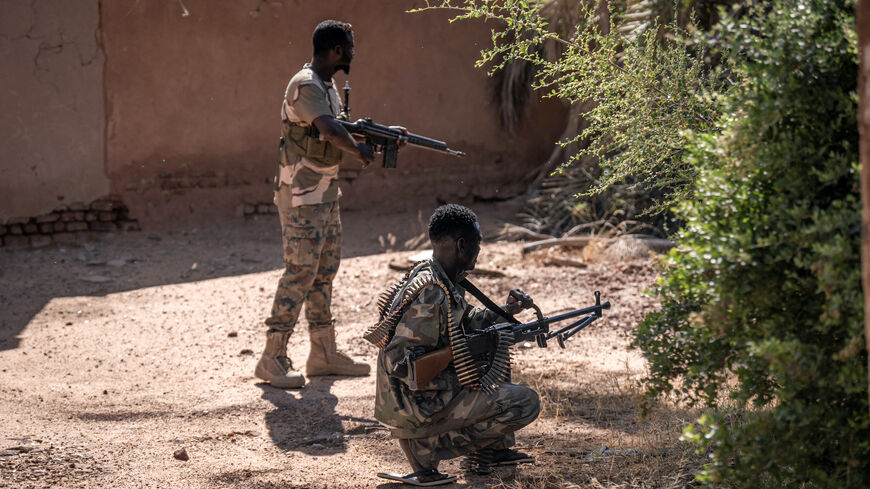'Khartoum is free,' Sudan's Burhan declares from presidential palace as RSF retreats
On Wednesday, the chief of Sudan’s army and the country’s de facto leader arrived at the presidential palace, by way of Khartoum International Airport, for the first time in nearly two years.

Sudan's Transitional Sovereignty Council, the country's de facto government, announced late afternoon on Wednesday that army’s commander-in-chief — Gen Burhan, who also heads the sovereignty council — arrived to Khartoum.
Images released by the SAF show Burhan at the presidential palace in central Khartoum. This marks Burhan's first time in the palace in almost two years. The RSF has held the presidential palace, along with most of Khartoum, since very early on in the war between the SAF and the paramilitary group, which broke out in April of 2023.
In a broadcast that aired Wednesday on Sudan state television, Burhan said, “Khartoum is free; it’s done.”
رئيس مجلس السيادة القائد العام يتفقد القوات بمطار الخرطوم ويزور القصر الجمهوري
— SUDAN News Agency (SUNA) 🇸🇩 (@SUNA_AGENCY) March 26, 2025
تفقد السيد رئيس مجلس السيادة القائد العام للقوات المسلحة الفريق أول الركن عبدالفتاح البرهان اليوم القوات المنفتحة بمطار الخرطوم الدولي ، كما تفقد القوات بالقصر الجمهوري. pic.twitter.com/MZdfgYKVAG
Sudan’s official news agency, SUNA, reported that Burhan arrived to Khartoum via the Khartoum International Airport, indicating that the SAF has in part, or in full, taken back the airport, another location that has for almost two years been under RSF control.
Burhan’s return to the palace comes amid an offensive launched by the SAF last week that saw the army retake the presidential palace on Friday.
An army source told Agence France Presse on Wednesday that the army has made other key advancements, surrounding the Jebel Awliya area in the city’s south and securing both sides of the Manshiya Bridge, which lies over the Blue Nile River.
At the same time, the Sudan Tribune, citing activists in Khartoum, reported that the capital is seeing “large-scale” withdrawals of the RSF from neighborhoods in the city, including the Gereif West, Burri, Sahafat and Kalakla neighborhoods.
Know more: As the army retook most of Sudan’s capital, it also launched an attack on the area in which the RSF has the strongest hold: Darfur.
A Sudanese war monitor, Emergency Lawyers, said on Wednesday that the SAF had conducted a shelling of a market in the town of Tora in North Darfur on Monday. One local aid group, Darfur General Coordination of Camps for the Displaced and Refugees, said at least 54 people were killed. Another local aid group, Darfur Victims Support, cited witnesses at the scene who reported that 126 civilians were killed in the attack.
The attack sparked condemnations from local Sudanese aid groups as well as international groups. SAF spokesperson Brig. Gen. Nabil Abdullah denied that civilians had been targeted in the attack.
The attack signals an escalation in Darfur and could be an indication that the SAF will not be satisfied with RSF strongholds anywhere in the country.
Following the RSF’s announcement in early March that it had signed a transitional constitution and thus established a parallel government, many experts pointed out that this could lead to a partitioning of the country, with the RSF controlling its strongholds in Darfur and other areas in southern Sudan, and the SAF controlling the northeast and central areas of the country.
Monday’s escalation, however, indicates that the SAF may try to ensure that such a partition does not happen — meaning the war could continue.
There is also the risk of the conflict spilling over into neighboring Chad, which the SAF has repeatedly accused of assisting the RSF by allowing weapons to be funneled through its airports and the RSF to launch attacks from its air strips and bases.
After taking back the presidential palace, Yasser al-Atta, assistant commander in chief of the SAF, threatened revenge on those supporting the RSF, including Chad. Atta said that the army “will take retaliatory action against Mahamat Kaka [formally known as Mahamat Deby], the president of Chad. ... We warn him that the airports of N’Djamena and Amdjarass are legitimate targets for the Sudanese Armed Forces.”
On Monday, Chad’s Ministry of Foreign Affairs said that the statements “can be interpreted as a declaration of war if actions follow them” and that “Chad reserves the right to respond forcefully to any attempt at aggression.”
The war has resulted in a death toll that could be as high as 150,000, according to estimates from the US government and Yale University's Humanitarian Research Lab. In February, the UN reported that over 12.5 million people, nearly a quarter of the population, have been displaced by the violence, and just a month earlier it said that some 3.2 million children in the country are expected to face acute malnutrition this year.







